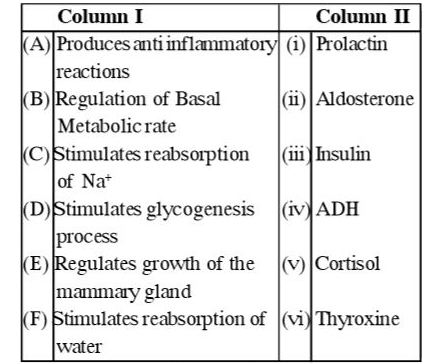The function of insulin hormone is :-
To release glucose from liver cells and glycogenolysis promotion
To increase cellular glucose uptake and consumption
To increase blood sugar level
To increase lipolysis
The correct Answer is:B
Step-by-Step Solution:
1. Understanding Insulin's Role: Insulin is a hormone produced by the pancreas that plays a crucial role in regulating blood glucose levels. Its primary function is to lower blood sugar levels when they are elevated.
2. Glucose Production and Usage: When we consume food, it is broken down into glucose, which is then used by the body to produce ATP (adenosine triphosphate), the energy currency of the cell. This glucose is transported through the bloodstream to various cells in the body.
3. Blood Glucose Levels: The body maintains blood glucose levels within a certain range. If blood glucose levels rise above normal (hyperglycemia), the pancreas releases insulin to help lower these levels. Conversely, if blood glucose levels drop (hypoglycemia), other hormones like glucagon are released to increase glucose levels.
4. Insulin's Mechanism of Action:
- When insulin is released, it signals body cells to take up glucose from the blood.
- It promotes the conversion of glucose into glycogen for storage in the liver and muscle cells (a process known as glycogenesis).
- Insulin also inhibits the production of glucose by the liver (gluconeogenesis) and encourages the use of glucose for energy production.
5. Overall Function of Insulin: The overall function of insulin can be summarized as:
- Increasing cellular glucose uptake and consumption.
- Lowering blood glucose levels by promoting the storage of glucose as glycogen.
- Facilitating the use of glucose for energy production.
Conclusion:
The function of insulin hormone is to increase cellular glucose uptake and consumption, thereby helping to regulate blood sugar levels effectively.
---
- When insulin is released, it signals body cells to take up glucose from the blood.
- It promotes the conversion of glucose into glycogen for storage in the liver and muscle cells (a process known as glycogenesis).
- Insulin also inhibits the production of glucose by the liver (gluconeogenesis) and encourages the use of glucose for energy production.
- Increasing cellular glucose uptake and consumption.
- Lowering blood glucose levels by promoting the storage of glucose as glycogen.
- Facilitating the use of glucose for energy production.
The function of insulin hormone is to increase cellular glucose uptake and consumption, thereby helping to regulate blood sugar levels effectively.
Topper's Solved these Questions
Similar Questions
Knowledge Check
Insulin promotes
AA) glycogenesisBB) glucosuriaCC) glycogenolysisDD) gluconeogenesis
The pro-hormone insulin is processed to become a fully mature and functional insulin hormone by removal of
View SolutionHow is a mature, functional insulin hormone different from its pro-hormone form?
View SolutionInsulin is
View SolutionInsulin is
View SolutionThe function of enterogasterone hormone is
View SolutionThe function of enterogasterone hormone is
View SolutionMatch the function of hormone in column I with their hormone in column II

View Solution
